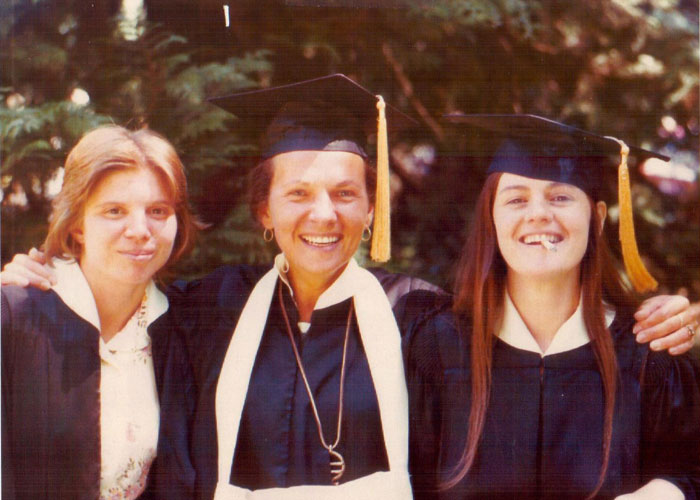President Zinser, faculty, Alumni Board, past alumni awardees, alumni staff, and guests, thank you for this honor.
I want to introduce Marie Bagley, my partner (please stand as I say your name); my son, Tom Dalton; my sister Marilyn Fitzgerald; and my friend all the way from Detroit, Sue Blouch.
I’ve been reflecting on what makes a person or groups work for change and organize for change. I believe working for change is greater than change itself.
Learning about the dialectic of change while at the University of Detroit—as a returning student and mother of three struggling with the notion of two steps forward, one step back—helped formulate for me, the idea of Hope.
And there is always Hope. A chance to re-examine, to start anew, to get another chance. We all need another chance in life.
SOU provided me with another chance, a new beginning for me and for my family. A place to house ourselves. We are all students of life here.
I’d like to introduce all the agents in this room with whom I personally have journeyed for change. Please stand and say your name as we review together, the 70s, the 80s, the 90s, the year 2000 on.
The 70s, stand.
The 80s stand.
The 90s stand.
The 2000s and on, stand.
Thank you.
What’s changed, what have you helped change?
We put our young children in the first preschools for severely learning disabled; we loaded them on their first bus rides without their fearful parents; we entrusted them into “mainstream” school settings. They are still seen as “retards,” but they helped mainstream the word “retard,” so now everyone “gets” to be one through common name-calling.
We helped integrate our schools with affirmative action—until integration became a dirty word. Multiculturalism and diversity are coins now that capture the struggles we faced in our own homes when we confronted racism and homophobia in our parents, our families, our friends.
We faced our own oppression and had the courage to leave abuse, to help others flee domestic violence. We expanded our consciousness and faced our own sexually and emotionally abusive situations. We used and continue to use the word feminism as we witness our theory being integrated without a footnote into textbooks, trainings, everyday encounters.
We argued against sexist practices, worked to institute policies locally and nationally against sexual harassment, discrimination in our schools. We argued for nonsexist language, Title IX, the ERA. We’ve written empowerment into women’s studies texts. We confront our own bias as we seek global understanding of women’s lives.
Today, we feel the powerlessness of war upon us again. Vietnam taught us the process of aggression. We’re strategizing and awaiting the “aha” moment when our voices will be heard again as we face the deleterious effects of our present imperialism and the war-mongering mentality of our country.
We learned tons about money—and that we know nothing about money. We continue to be out of the loop in terms of real financial understanding of how money really works.
Today, we face new lessons of tolerance as we grope to understand new definitions of gender—a smashing finality of gender confinements that continue to oppress us.
Congratulations, you agents for change.
